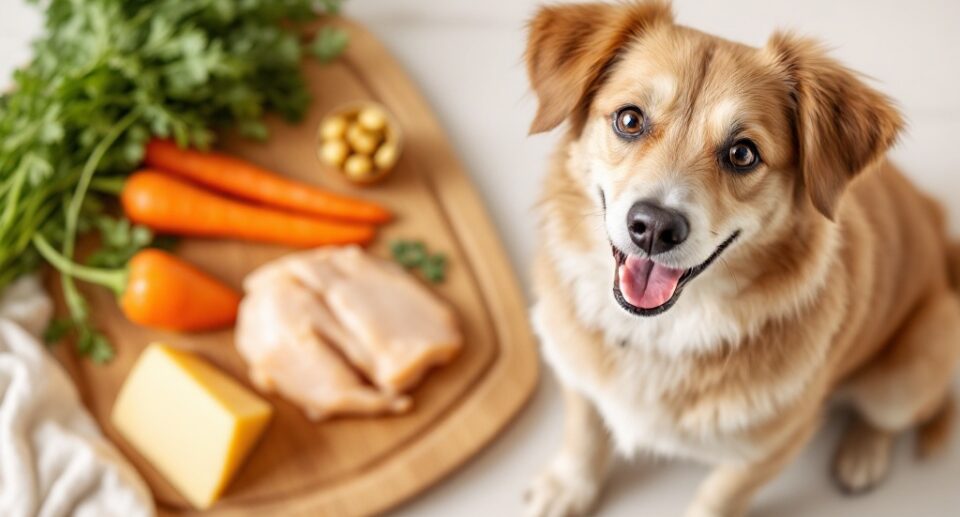What Human Food Can Dogs Eat?

Key takeaways
- Always check ingredients for harmful additives like xylitol, and consult your veterinarian to ensure your pup’s diet stays balanced and nutritious.
- Sharing certain human foods with your dog can be a great way to boost their health and strengthen your bond.
- Introduce new foods slowly and watch for any signs of digestive issues or discomfort.
- Always consult your veterinarian before introducing new foods to your dog’s diet.
Dogs love to be part of mealtime, eagerly watching for a chance to snag a bite of whatever you are eating. As pet parents, we naturally want to share our favorite foods with them, but it is important to know which ones are safe and which could be harmful.
Before adding human foods to your dog’s diet, consult a veterinarian or pet nutritionist to ensure you are making the best choices for their health. If you are considering raw or homemade meals, it is especially important to get expert guidance to maintain the right balance of protein, fats, vitamins, and minerals. Not all human foods provide the nutrients dogs need, and some may cause digestive upset or long term health issues if not properly portioned.
When it comes to sharing food with your dog, knowledge is key. PetHealthMD is a trusted resource for reliable, vet approved information on pet nutrition and safety, helping you make the best choices for your furry friend.
Let us take a closer look at which human foods are safe for dogs and which ones pose a risk.
Peanut Butter
Few things make dogs happier than a spoonful of peanut butter. Not only is it delicious, but it is also packed with protein and healthy fats, making it a great occasional treat when served the right way.
To keep treat time both fun and safe, follow these simple tips:
- Choose natural, unsweetened peanut butter and make sure it is xylitol free.
- Spread a small amount inside a Kong or puzzle toy to provide enrichment.
- Stick to about half a tablespoon for smaller dogs and one tablespoon for larger breeds.
- Smooth peanut butter is safer than chunky varieties.
- Introduce peanut butter slowly and watch how your dog reacts.
- Use a tiny dab during training sessions for extra motivation.
With the right kind of peanut butter and mindful portions, this classic treat can be a safe and enjoyable addition to your dog’s snack routine.
Eggs
Eggs are a fantastic, nutrient packed food for dogs, offering high quality protein to support strong muscles and healthy tissue. They are also rich in vitamins A and B12, making them a great choice for dogs with sensitive stomachs.
Cooked eggs are always the safest option. Hard boiled, poached, or gently scrambled eggs work well. Cooking eliminates harmful bacteria while preserving nutrients.
- Small dogs can have one egg per week.
- Larger breeds can have up to three eggs weekly.
If you want to enrich mealtime, try mixing small pieces of cooked egg into your dog’s food. Increase portions slowly and monitor digestion.
You can also grind dried eggshells into a fine powder and sprinkle a quarter teaspoon over meals once or twice a week to boost calcium intake. This simple supplement supports strong bones and healthy teeth.
Fruits
Fruits can be a tasty and nutritious addition to your dog’s diet. Apples provide vitamins A and C and support dental health. Cut apples into bite sized pieces and remove the seeds and core.
Watermelon is another hydrating treat, especially on warm days. Remove seeds and rind before serving 2 to 3 one inch cubes.
Bananas make a gentle, easily digestible snack. Try 2 to 3 thin slices for small dogs or half a banana for larger breeds.
Blueberries are rich in antioxidants and vitamins. A good serving size is 8 to 10 berries for medium sized dogs.
Fruits should make up no more than 10 percent of your dog’s daily food intake.
Vegetables
Adding vegetables to your dog’s diet can be nutritious and fun. Many veggies offer essential vitamins, minerals, and fiber that support digestion and overall health.
Carrots provide vitamin A and potassium, and their crunch helps clean teeth. Frozen carrot pieces can soothe teething puppies.
Broccoli florets offer vitamin C and calcium, while green beans and Brussels sprouts provide gentle fiber.
Vegetables should complement your dog’s diet and make up no more than 10 percent of daily intake.
Yogurt
Yogurt is a nutritious treat with probiotics that support digestion and immune health.
To make yogurt safe for your dog:
- Choose plain, unsweetened yogurt.
- Check labels to ensure it is free of xylitol.
- Start with one teaspoon per 20 pounds of body weight.
- Mix with dog safe fruits like blueberries or bananas.
- Serve at room temperature.
Introduce yogurt gradually and watch for digestive sensitivity.
Sweet Potatoes
Sweet potatoes are nutrient rich and dog friendly. Always bake or steam them without seasonings, then remove the skin and cut into suitable pieces.
Packed with vitamins A and C, protein, and manganese, sweet potatoes support immune health, energy, and digestion. Start with one tablespoon for smaller dogs or two tablespoons for larger breeds.
Pumpkin
Pumpkin is a trusted food that supports digestive health. A spoonful mixed into meals can help firm loose stools.
Pumpkin is rich in fiber, vitamins A and C, and potassium. It is also low in calories, making it suitable for weight management.
Start with half a teaspoon for small dogs and increase as needed. If using canned pumpkin, make sure it is 100 percent pure pumpkin with no added sugars or spices.
You can freeze small portions in ice cube trays for convenience.
Bringing Joy to Your Dog’s Diet with Safe Human Foods
Adding new foods to your dog’s meals can make mealtime more exciting. Start simple, such as offering a small piece of banana as a training reward or mixing a spoonful of plain yogurt into dinner.
Treats should make up no more than 10 percent of daily intake to maintain a balanced diet.
Your veterinarian can help create a tailored meal plan. You can also explore helpful wellness options by browsing PetMeds’ selection of dog vitamins and general dog health supplies. These resources support your pup’s overall health and happiness.





